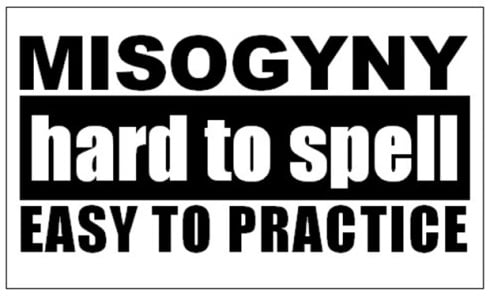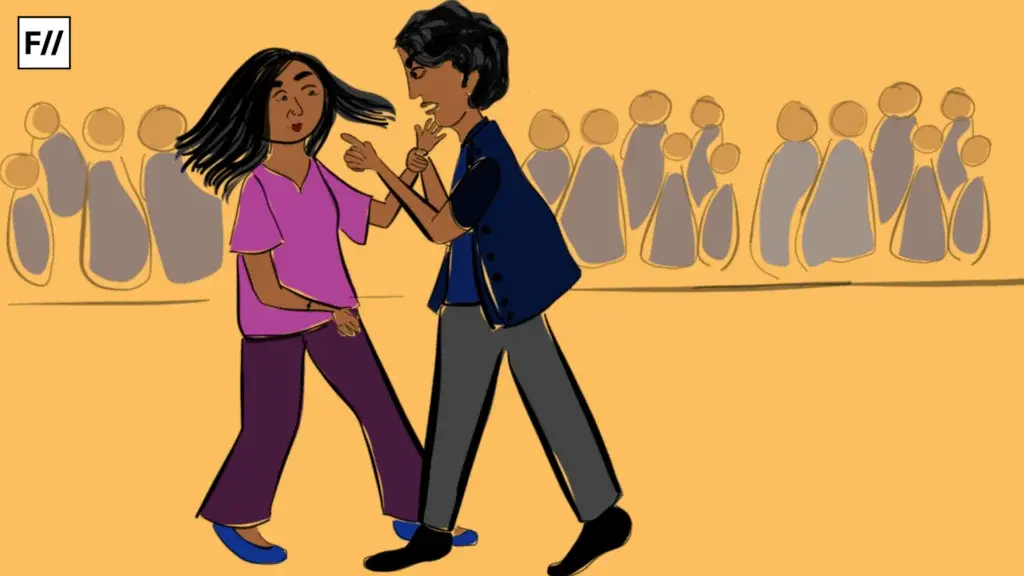Posted by Bharathi Surendran
Most of the anti-feminists I encounter online on Quora share a few characteristics – an emotionally driven tone and a smug “Ha! Checkmate, feminazis!” attitude. Often, flimsy rhetoric riddled with logical fallacies is spewed in an attempt to discredit the points gender equality activists put forth.
More often than not, the debate veers way off-track, and the actual issue gets ignored in the wild flurry of juvenile name-calling, butthurt retorts, and ad hominem attacks. After seeing the same flawed rationalisation being put forth half a billion times – and having grown quite tired of it – I decided to embark on a mission to scrutinise some of the most common arguments I have come across online.
- “You can’t chastise us for demanding dowry when you women expect a seven-figure salary from your grooms!”
An extremely common defence, and a fundamentally flawed one at that. Just yesterday, I came across this answer on Quora, which stated this as a man/woman double standard.
How Marriages Are Fixed In Our Society
In the Indian context, a groom who seeks car/cash/real estate from the bride’s family at the time of marriage is asking for DOWRY. Demanding dowry is punishable under Indian law (and rightly so). But, a girl who is only willing to marry a guy if he earns 3x her salary has ancestral property, and lives in a house of his own is supposedly just ensuring financial security and a great future.
I do not advocate exchange of dowry, at all. But, why such double standards?
The writer did add the disclaimer, but the damage is already done. To a layperson, the comparison seems accurate. Quite unfortunate, as upon closer inspection, the entire argument falls apart.
The entire explanation is a classic false equivalence, where factually incorrect parallels are drawn between two fundamentally dissimilar entities. Dowry, as we all know, is a business transaction, where there is a transfer of money and property from one family to another.
The bride’s family suffers a substantial loss, as while social customs dictate that they handle most of the cost of the wedding proceedings, exorbitant dowry demands increase their financial burden. The financial aspect apart, the foundation of the dowry narrative is flawed in the extreme, where it appears as though the groom’s family is selling him out to the highest bidder.
Furthermore, the bridegroom isn’t going to be threatened, abused, or killed by his in-laws for failing to earn more, is he?
- “99% of all rape allegations are false! Not all men are rapists!”
False allegations of rape and sexual assault are a concern, yes. They hurt the credibility of victims, ruin the lives of innocent people and increase the already heavy workload of enforcement and the judiciary.
Upon scrutiny, false rape cases statistics poses a worrying picture. Rukmini Shrinivasan, a data journalist, analysed the 460 rape cases brought to the Delhi HC in 2013, and found out that an overwhelming percent of false cases were filed by parents of the ‘victim’, who would rather land an innocent man in prison than accept the fact that their adult daughter had consensual sex with a man of her own choosing.
Sounds bad? It gets worse.
Another large category – nearly a quarter of the total – were cases where the man had broken his promise to marry the woman. Although this would not be considered rape in many countries, in India a man can be charged with falsely obtaining consent for sex if he promises to marry a woman and then changes his mind. The parents say, ‘You’ve lost your virginity, it’s going to be impossible to get you married, you file this case, he’ll get scared and he’ll marry you,’ says Shrinivasan.
Clearly, women aren’t filing false cases out of spite or greed or to extort money, instead, women who chose their sexual partner are being shamed by their families into making a mockery of the system.
However, the stats tend to distract us from the real issue, which is under-reporting of sexual assault and rape. A 2014 study using data from the Indian National Crime Records Bureau and the National Family Health Surveys suggests that only 6% of incidents of sexual violence against women are reported to the police.
It is to be noted that researchers say that stranger rape isn’t as common as one would think, and that in over 95% of the cases, the perpetrators are known to the survivors, and thus, sexual assault is severely under-reported.
Clearly, shame and disgust over being raped cause people to not report the crime. On other hand, women in consensual relationships file false cases as the regressive mentality prevalent in the populace looks down upon non-marital relationships. Thus, everything boils down to women being shamed for either being raped or for having consensual sex.
Why is the false rape case argument illogical then you ask?
Because it’s a straw man.
Whenever someone brings up the topic of false allegations in a discussion about rape and sexual assault, they end up detracting the subject of rape as the debate veers into a totally different territory. The theme of discussion changes, and suddenly, it is no longer a discussion about rape, but an emotionally charged screaming match.
Vishak Raman, an outspoken feminist, writes about his frustration with this argument on Quora, and his annoyance is palpable. “Somehow, the registration of a false case of rape against one man is enough to eliminate the need for social education of the entire populace to prevent violence against millions of women.”
Also Read: The Problem With The ‘Monster’ Theory Of Rape
3.“You can’t call Hinduism sexist! We worship goddesses!”
Firstly, no one never mentioned Hinduism.
Worshipping goddesses makes you nought but a goddess-worshipper.
And no, Hinduism is plenty sexist. Shruthi Sailesh, a sensible feminist and collegian, writes, “As feminists, we have to be able to speak honestly about patriarchal systems, and religion is no exception. Organized religion has long been intertwined with the oppression of women.”
Is religious freedom absolute?
Can gender equality be sacrificed at the altar of tolerance and freedom of religion?
Does religious tolerance mean feminists should turn a blind eye to the outrageous ideas and practices being spread by religious forces?
These are important questions, and people are often too ready to label us as ‘intolerant’, ‘xenophobic’, and ‘racist’. However, criticism of a religious doctrine is never a slight aimed at the followers of faith. Ideas are open to interpretation and critique, and religion is no excuse for bigotry.
Coming back to this completely illogical defence, worshipping goddesses and demeaning real living women makes you a bigot. No excuses.
- “Men and women are biologically different! Men can’t give birth!”
I came across this ridiculously sexist article on Quora, and it left me baffled. Although written by a troll, the sentiment seems to be shared by many.
No one’s denying that men and women and biologically different. However, these differences shouldn’t be allowed to prevent people from being equal in the eyes of law and society.
Gender equality is not ignoring the biological differences between men and women.
Gender equality is understanding that men and women, despite their biological differences, are equal, and should be considered equals in the eyes of the law and the society, and hence, accorded equal opportunities, with no discrimination of any kind whatsoever.
- “How can you be against sex-selective abortions when you advocate for ‘my body my rules’? Aren’t you being hypocritical?”
I would have to be a bit more nuanced in my approach to this one. Unlike the others, this counter is important and sound, as it raises questions about the limits of the “my body my choice” narrative. While I am not against abortion rights, I have often wondered whether my slamming of sex-selective abortion contradicts my conviction in bodily autonomy.
While the ban on sex-selective abortions contradicts my libertarian sentiments – as I view bodily autonomy as something non-negotiable. I am not really in awe of the government enforcing its authority on women’s bodies – I am very aware of how grave the status of the girl child in India is. The sex-ratio is getting worse, and the only way to improve it is to bring about a radical change in the public attitude and to get rid of the harmful ideas prevalent in the populace.
Choice isn’t as simple as one would think. It is influenced by a lot of factors, including the cultural beliefs of the place and people one grew up with. Choices aren’t made in vacuums and are often influenced by expectations. Expectations which often tend to be gendered.
Also Read: The Perils Of Being A Woman In The Online Realm | #DigitalHifazat
Bharathi Surendran is a high schooler who harbours a deep-seated loathing for writing bio’s, lest she comes off as pompous. A woman who considers ‘radical SJW’ a term of fond endearment, she likes to eat and sleep. She can be followed on Quora and Twitter.
Featured Image Credit: The Textual Silence Project
About the author(s)
Guest Writers are writers who occasionally write on FII.





Excellent article. (I too agree that SJWs like Martin Luther King etc are heroes. I do not have the courage to be an SJW myself.)
I left Quora for many reasons, some of which are its real name policy (I don’t want to be stalked thank you very much), its never ending stream of advertisements blending in with the questions and the constant sexism and occasional bit of misogyny.
‘Quora’ could be a euphemism for double standards.
I received a warning from Quora for suggesting to an NRA member (who delighted in berating “bleeding heart, commie lefties”) that they might be selfish.
And a few days previously I was invited to read a blog post written by a hip-hop enthusiast celebrating the word choices made by popular rappers. In particular, – replacing the word ‘woman’ with ‘b****’. So all of a sudden the ‘b****’ word is cool and edgy and because black men who use it are also discriminated against we shouldn’t question its use. Women know your place.
I flagged the post because like the ‘N’ word, the ‘B’ word is also hate speech.
I don’t know if my flagging posts like that makes any difference. The photos of women wearing bikinis kept popping up, attached to ads and weight loss blogs. There were never photos of men. It didn’t feel like a positive, healthy environment.
I don’t miss it.